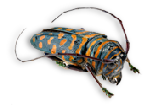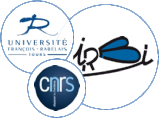Much research in evolutionary biology has been devoted to evolutionary novelties and trait acquisition. The reciprocal process of trait regression has received considerably less attention, even though phenotypic regression can also affect the evolutionary trajectories of lineages. Trait regression occurs when a phenotypic function is unused, such as eyes in cave-dwelling organisms, or when a phenotypic function is deleterious in a novel environment. A shift in environmental conditions can also lead to reversion of a degraded phenotype to its former state once it is favored by selection once more. The question is how trait regression affects trait dynamics and which conditions fuel phenotypic degradation and potential reversion.
Our current research focuses both on the regression and reversion of lipid synthesis in parasitoids. As larvae, parasitoids develop inside or on other arthropods, whereas the adult stage is free-living. The parasitic larval lifestyle likely facilitated parasitoids with the means to avert costly lipid synthesis by consuming or even increasing resources contained within their hosts, rendering their own lipid synthesis redundant and prone to regression (Visser & Ellers 2008).
Lack of lipogenesis predominates in parasitoids and has evolved concurrently with the parasitic lifestyle on three separate occasions in flies, beetles and wasps (Visser et al 2010). Some parasitoids do synthesize lipids, however, and this variation is not just observed between species, but also within populations of the same species. Such variability leaves us to question if lipogenesis is more labile in some parasitoid species compared to others.
Our aim is to elucidate how selection acts on lipogenic ability in parasitoids. Using a parasitoid species that shows intra-specific variability in lipid synthesis we will first determine which environmental conditions have fuelled regression and reversion of this trait. We will then force a switch in strategies to reveal how fast evolutionary trait transitions can take place.
Institut de Recherche sur la Biologie de l'Insecte
UMR 7261 Faculté des Sciences et Techniques
Avenue Monge, Parc Grandmont
37200 TOURS (France)
Publications
Le Lann C, Visser B, Mériaux M, Moiroux J, van Baaren J, van Alphen JJM & Ellers
J. 2013. Rising temperature reduces divergence in resource use strategies in coexisting
parasitoid species. Oecologia Online early DOI 10.1007/s00442-013-2810-9.
Visser
B, Le Lann C, Snaas H, Hardy ICW & Harvey JA. 2013. Consequences of resource competition
for sex allocation and discriminative behaviors in a hyperparsitoid wasp. Behavioral
Ecology and Sociobiology Online early DOI 10.1007/s00265-013-1627-1
Harvey JA, Visser
B, Le Lann C, de Boer J, Ellers J & Gols R. 2013. Convergence and divergence in direct
and indirect life-history traits of closely related parasitoids (Braconidae: Microgastrinae).
Evolutionary Biology Online early DOI 10.1007/s11692-013-9253-4
Visser B, van Dooremalen
C, Vázquez Ruiz A & Ellers J. 2013. Fatty acid composition remains stable across
trophic levels in a gall wasp community. Physiological Entomology Online early DOI: 10.1111/phen.1203
van
der Sluijs I, Dijkstra PD, Lindeyer CM, Visser B, Smith AM, Groothuis, TGG, van Alphen
JJM & Seehausen O. 2013. A test of genetic association among male nuptial coloration,
female mating preference, and male aggression bias within a polymorphic population
of cichlid fish. Current Zoology 59: 221-229.
Visser B, Roelofs D, Hahn DA, Teal PEA,
Mariën J & Ellers J. 2012. Transcriptional changes associated with lack of lipid
synthesis in parasitoids. Genome Biology and Evolution 4: 752-762.
Ellers J, Kiers
ET, Currie CR, McDonald BR & Visser B. 2012. Ecological interactions drive evolutionary
loss of traits. Ecology Letters 15: 1071-1082.
Harvey JA, Cloutier J, Visser B, Ellers
J, Wäckers FL & Gols R. 2012. The effect of different dietary sugars and honey on
longevity and fecundity in two hyperparasitoid wasps. Journal of Insect Physiology
58: 816-823.
Visser B & Ellers J. 2012. Effects of a lipid-rich diet on adult parasitoid
income resources and survival. Biological Control 60: 119-122.
Le Lann C, Visser
B, van Baaren J, Van Alphen JJM & Ellers J. 2012. Comparing resource exploitation
and allocation of two closely related aphid parasitoids sharing the same host. Evolutionary
Ecology 26: 79-94.
Ellers J, Ruhé B & Visser B. 2011. Discriminating between energetic
content and dietary composition as an explanation for caloric restriction effects.
Journal of Insect Physiology 57: 1670-1676.
Visser B, Le Lann C, den Blanken FJ,
Harvey JA, van Alphen JJM & Ellers J. 2010. Loss of lipid synthesis as an evolutionary
consequence of a parasitic lifestyle. Proceedings of the National Academy of Sciences
of the USA 107: 8677-8682.
Visser B & Ellers J. 2008. Lack of lipogenesis in parasitoids:
A review of physiological mechanisms and evolutionary implications. Journal of Insect
Physiology 54: 1315-1322.














